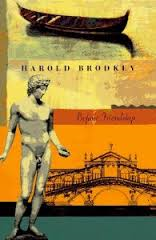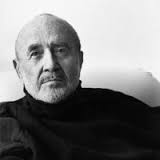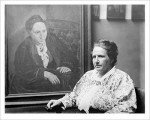Love in Venice
Harold Brodkey, Profane Friendship (1994).
The literary career of Harold Brodkey (1930-1996), which began so promisingly with short stories, many of them initially published by the New Yorker, and then collected in First Love and Other Sorrows (1958), turned out to be, according to the broad consensus, pretty much a thorough failure. The critical judgment has held. Casual readers would be unlikely to recognize his name today, almost two decades after his death.
I recently happened upon Brodkey’s second and last novel, Profane Friendship (1994), more or less by accident. I was heading off to Venice, Italy, on a brief trip with friends. It’s a fabled city that I’d never seen — an odd omission for an elderly traveler whose itinerary takes in a good many European urban centres, including the one in which I live half the year, Berlin. Anyway, I thought minimum preparation for even a short visit ought to include a book set in Venice. Since I’d already read and re-read Thomas Mann’s Death in Venice, and didn’t have Henry James’s or Theophile Gautier’s essays on Venice at hand, I rummaged around on my shelves and found Brodkey’s novel (I can’t remember how or why I acquired it). It’s about a love affair between two adolescent boys, one American, the other Italian, set in Venice, mostly just before and after World War II, with a closing update section, still in Venice, in the early 1990s, when the book’s protagonists are men in their 60s.
But before reflecting on the at least partially successful literary accomplishment that Brodkey, despite his great overall failure, managed in Profane Friendship, and apparently elsewhere, I should say something about the unusual story of this now almost forgotten writer. Brodkey died in 1996, at age 65, of AIDS. Though not gay himself, or not self-declared as such, he admitted to having “experimented” with homosexuality earlier in life, in adolescence (as Profane Friendship posits), and then in the 1960s and 70s, presumably between an early first marriage and a middle-aged second marriage that bookended his domestic life, and had been infected with the then-fatal virus through his gay encounters.
The alleged failure of Brodkey’s writing revolves around his long-delayed first novel. Soon after his early, fashionable success as a New Yorker short story writer, Brodkey signed a contract in 1964, with Random House, for a first novel, tentatively titled A Party of Animals. What made readers interested in Brodkey’s work was his ability in his short stories to explore individual consciousness in dense prose that at once seemed to slow time down and yet moved with considerable velocity, a style unlike that of any of his contemporaries. His techniques and interests seemed to promise the makings of a distinctive novelist.
Despite the anticipation that Brodkey would turn his talents to longer forms, half a decade after he’d contracted for the novel, the unfinished book was sold to another publisher, and a decade after that, in 1979, to a third. As a Paris Review interview with Brodkey sardonically noted in its intro, “the work became something of an object of desire for editors; it was moved among publishing houses for what were rumored to be ever-increasing advances, advertised as a forthcoming title in book catalogs, expanded and ceaselessly revised, until its publication seemed an event longer awaited than anything without theological implications.” In 1983, the press reported that Brodkey’s unfinished novel was allegedly 4,000 pages long and had been announced as forthcoming “next year,” every year since 1973. (Most of this story can be found in the entry “Harold Brodkey” in Wikipedia.)
Meanwhile, Brodkey continued to publish short stories, many of which seemed to be autobiographical and were sometimes announced as fragments of the long-awaited novel. At the same time, Brodkey’s reputation was wildly inflated by editors and critics; his editor at Knopf, Gordon Lish, called the novel-in-progress “the one necessary American narrative work of this century.” Literary scholar Harold Bloom anointed Brodkey as “the American Proust.” To make matters worse, Brodkey appeared to believe the notices about himself and his unwritten book, and developed “his own penchant for extolling his reputation,” as one critic put it, which made him “difficult” to deal with, as people politely say about such self-absorbed characters. The novel continued not to appear, although a volume of short fiction, Stories in an Almost Classical Mode (1988) kept Brodkey in the literary conversation. However, the nearly three decade delay of the oft-promised novel turned the project into a sort of literary joke among critics who had been relentlessly subjected to news of Brodkey’s impending greatness and had grown distinctly sour when it failed to arrive.
When The Runaway Soul, a 900-page Bildungsroman, was finally published in 1991, as Brodkey entered his 60s, “it could not but have been a disappointment,” critic Jonathan Baskin retrospectively noted. It only confirmed, said Baskin, “the unsuitability of Brodkey’s prose for an expansive fictional endeavor. Essentially plotless, the book is a palimpsest of discontinuous vignettes with little connective tissue.”
The reviewers of the day were even less kind. Indeed, the backlash was severe. Critic Bruce Bawer wrote, “The plain fact is that 99 percent of the prose here is gawky, aimless, repetitive, murky, and pretentious—and there are few more unenviable literary experiences than having to read over eight hundred pages of it.” He declared that the novel was “one of the literary fiascos of all time.” The New York Times’ Christopher Lehmann-Haupt found the book to be filled with “bogus philosophizing” and “paradoxical non-art,” written in a prose that was “verbose, repetitive, overstuffed with adverbs, of questionable sense, tedious and just plain ugly.” Reviewer Hilton Kramer said it was “appalling” to behold a “grown-up mind mired for nearly three decades in this fruitless task of writing and overwriting,” all the while “scarcely noticing that the world was passing through adventures and upheavals far more compelling and far more interesting” than his own. And that was pretty much it for Brodkey’s literary career — his work was condemned as self-indulgent, narcissistic and manipulative.
In his few remaining years, Brodkey, having broken through, not so much a writing block as a book completion block, published a second novel, which was then overshadowed by his blunt announcement in a series of New Yorker essays that he had AIDS (the essays formed the basis for a last book, This Wild Darkness: The Story of My Death (1996)). Even this deathbed testament wasn’t spared; the Baltimore Sun reviewer savaged the “long and self-indulgent stretches of the author’s much-touted mystical prose” and wrote that “watching Brodkey watch himself die by inches becomes, ultimately, tedious.” Since his death, little has been said or written about Brodkey and his work. A decade after his passing, in 2006, Jonathan Baskin noted that Brodkey was “all but forgotten” and asked, “ten years after his death, is a reassessment due?” (Jonathan Baskin, “Fading Fast,” Bookforum, Feb.-March 2006.) Few people thought so, and now, almost twenty years after his death, a biography of Brodkey has yet to appear. You’d think that the story of the colossal literary bust would be enough to pique the interest of some biographer but, apparently, not yet.
When I began reading Profane Friendship, I only vaguely recalled the above sorry saga of Brodkey’s literary life (I’ve since filled in some of the details), and didn’t think much about it. This is one of those rare instances where the patently false truism, “Ignorance is bliss” may be true. I came to Profane Friendship with what turns out to be the distinct advantage of not having read much Brodkey previously, or even having heard much about him during his days of impending fame and then disappointed hopes. What the critics ultimately came to find as tiresome turns of consciousness, literary tricks, and self-indulgent routines in Brodkey’s work was not part of my critical vocabulary, thanks to mere unknowing. As it turned out, I was able to read his Venice novel with some of the same excitement that his early enthusiastic readers must have experienced.
Profane Friendship, to get the critical assessment out of the way, is a pretty interesting book. Not great (after all, the very broad critical consensus couldn’t have been completely wrong about Brodkey), but nonetheless readable, and certainty it’s a book with something on its mind. Naturally, this is going to have to be one of those “how was it for me?” sort of post-coital readings. True, Brodkey’s novel no doubt contains a lot of that “verbose, repetitive, overstuffed with adverbs, tedious and just plain ugly” prose that critics complained of, and it’s probably too long by half, but I have to say that a lot of that verbosity, at least on first encounter, is exciting and suits the particular tale he’s telling.
The story is about two adolescent boys. One of them, Niles O’Hara, known as Nino, is growing up in Venice in the late 1930s, just before the fascist struttings of Mussolini and Hitler turn into World War II. Nino is the son of a successful expatriate American novelist who is, among other things, an acquaintance of Ernest Hemingway, but whose serious middlebrow historical romances apparently sell better than those of “Papa.” Nino’s counterpart, whom he first meets at the English school in Venice as a 9 or 10 year old, is Giangiacomo Gallieni, known as Onni, the son of a minor, but ambitious fascist functionary. The two boys become best friends at school and the first part of the story is an intricate account of the micro-dynamics that govern the intense relationships of children. The fictional memoir of childhood and adolescence is narrated by an elderly Niles, who has returned to Venice in the early 1990s.
(Given that critics had lost interest in Brodkey by the time Profane Friendship appeared, it’s unclear whether the sections about adolescence are autobiographical or simply fictitious. However, a posthumous volume called My Venice, consisting mostly of a patchwork of descriptive passages lifted from Profane Friendship plus other scraps of writing about Venice by Brodkey that his friends cobbled together in a slim sort of memorial volume, says on a jacket flap that Brodkey first visited Venice in 1960.)
The boys are separated by World War II. Nino returns to Venice, a year or so after the war’s end, with his mother and older brother (his parents have divorced, and his novelist father disappears from the picture). When Nino is reunited with Onni, he discovers a friend who has been damaged by the war in various ways, including sexually. Onni’s parents also fade from the story with the defeat of fascism’s ambitions. During the war, Onni’s androgynous beauty has been used (and abused) by successive conquerors (authoritative Nazis, Americans offering chocolate bars), and a survivor’s toughness envelops a naturally seductive soul.
The core of the book, about half its 400-page length, is devoted to the sensuous and cerebral relationship between the mid-teenage boys as they move intoxicatedly through a glittering, yet shadowy Venice of narrow lanes and undulant stretches of water. The intoxications are sexual, alcoholic, hashish-and-cocaine fueled and, always, apocalyptically emotional. Brodkey (and his narrator) is almost solely interested in what happens in this hothouse relationship, a pleasure-and-pain dome arising from the canals and islands that comprise Venice.
Although the critics are clearly justified in chiding Brodkey for his indifference to the conventions of the novel, Profane Friendship makes a stab, only fitfully successful, at novelistic structure, narrative progress and character development beyond that of the story’s protagonists. As novelist and reviewer Colm Toibin, explicating his claim that “none of the characters comes to life” in Profane Friendship, points out, “in the early pages of the book, when the narrator is explaining how his father was a friend of Hemingway’s and knew Pound, it seems that Brodkey had the idea of rooting his characters in an American expatriate scene, of placing them in history. This never becomes credible. The names are dropped, but their legacy is left there.” Toibin is certainly right. Instead, Brodkey’s narrative focus remains, as always, immersed in the task of finding, as Toibin says, “another language, broken and fast-flowing, to slow down experience as it is rendered in fiction, to make it more exact and true, to establish, if he can, the way in which several things happen in the mind at once, the ways in which sensations come not single spies but in battalions.” (Colm Toibin, “Insiderish,” London Review of Books, May 26, 1994.)
However, I think Nino and Onni sufficiently come to life, and remain in memory after the book is closed, despite its frustrations, longuers, and intellectual incredulities. Brodkey’s narrator, in media res (to say nothing of in flagrante delicto), muses:
It is a weird brotherhood to be friends. It is O.K. to feel stuff, to go too far. But I resist that. He feels the power he has. Some of that power is over my imagination because of the unsafe beauty he has and because of the fluid energy of his eroticism and his use of it… The reality of that energy of eroticism had nothing snobbish in it and not much self-protection. I mean that whorishness in him had these consequences.
He moves around the room, practical, not heavily nerved sexually, doom-laden although not fragile, a bad guy, not such a bad guy. Onni.
I think I knew that the great story for Onni was the conquest of the world — that story interested him. His willful-snotty beauty. He was happy enough perhaps, or perhaps not, but scandal and thrills beckoned to him. He was a thrill-hunting Italian boy. He enjoyed going quite near the rim of death.
‘Does thinking give you a hard-on, Nino? Does what you’re thinking give you a hard-on?’
‘Sure.’ I thought unclearly that erections were a failure of beauty to bring peace.
And a moment later:
We almost don’t need to gossip; our eyes have already seen what is there. Our eyes establish our type. We see each other’s male tactics in the world. My male tactic in the world is that I laugh when I want to be excused from my visible humanity. So, I laugh because he’d noticed I had dirty thoughts and was vain and was buffeted by his feelings and had an erection.
And finally, remembering that for Brodkey “finally” only means, “I am as imperfect and unabsolute — as unomniscient, as democratic even with written characters — as that,” there’s this:
Then he said, ‘Dance with me.’
‘No.’
He turns the radio on and comes over to the bed and puts his hand on my chest. ‘You have no muscle on your chest. Does this give you a hard-on, Nino? Dance with me.’
I didn’t yet feel my erections as urgency but mostly as embarrassment first and as a queer half-readiness that was embarrassing and yet which was unembarrassed.
One wants to conceal this and evade it.
‘How about you?’ I said, and he was erect at once — that shattered me.
Yes, they dance, and more. For some readers (Colm Toibin, say), “… most of the experience he describes is essentially horseplay between adolescents in the streets of Venice, and because he has no moral sense and no interest in history, but merely an ability to feel, there is a real thinness not merely in the texture of the book, but in every page, every moment.”
More sympathetic readers — Michael Wood, writing in the New York Times — are appreciative of the “effort to read the past through the anxious, insatiable eyes of the present, to see the turns and shifts of feeling in each moment of a long gone conversation or caress or walk along a street.” Wood adds, “Whole chapters go by with the characters frozen in mid-gesture or mid-remark, while our narrator racks his memory for the old secretions of meaning… But then perhaps for that reason the obsessively invoked sexual acts have a strangely slowed-down written effect: the pornographer as philosopher, alone with his words… Profane Friendship is a long, cerebral love song, and like many love songs, reveals the destructive wish that love, and the loved one could be other than they are.” (Michael Wood, “A Love Song of the Cerebrum,” New York Times, Mar. 27, 1994.)
It should be mentioned that in addition to the inflamed romance, Brodkey is also capable of conveying a sense of place (as the descriptive passages gathered in My Venice confirm). Nino/Niles, now an old man in Venice, on a walk past the morning fish market observes that
Trophies from the massacre of fish are piled on shiny beds of ice on tables under the roof in the open-sided structure. The fish at the end of their story, silver-bodied, with open red mouths and staring and unreal eyes, stink of brine, of the salt sea, stink of boats and are very still, gleaming and limp.
The early morning’s wet odors of rain, the smell of wet Venice, and the fish odor and the dirt and leaf smells of vegetables, and the drifting smell of gasoline fumes from the heavy workboats carrying food to the wharfside… Me with my head erect under a gray umbrella, my remaining hair damp, my dry eyelids refreshed… I am a passerby in a fish market, gaudy-scaled, stinking, among the brown-tailed, sharp-finned fish, and the pale calamari and slow-stalking green aragosti…”
In the end, it is a book about an unusual love, but love nonetheless. Brodkey’s narrator declares, “And I reserve the right to be mistaken, to be merely a crazy old man yelling at you that ‘love … love … love … Love exists … I say so … But it exists only in reality and only without fantasy and only in the ways that reality permit it to exist …'”
If nothing else, Brodkey is good at tracing the conflicting, watery, sloshing currents of micro-feelings that animate the dynamic of love. The sex in the story, conveyed with teasing, seductive passages, remains ambivalent, as homosexual sex apparently was for Brodkey. But then, the story is not really about sex — it’s there because of the animal spirits of adolescence — it’s about something more complicated. I don’t know if, in order to pleasurably read this book, you have to be interested in the relations of adolescent boys. I assume not, but maybe it helps. If there is such a requirement, I obviously qualify.
I suppose that any story with Venice, an adolescent boy or two, and an elderly artist (when Nino and Onni meet in Venice in old age, we find out how their entangled destinies have played out) puts us in mind, in an inevitably cliched way, of Mann’s Death in Venice. But perhaps the closest literary relative of Brodkey’s Profane Friendship, although not set in Venice, is Alberto Moravia’s mid-20th century pair of novellas, Two Adolescents, with their similar sexual initiations, Oedipal struggles, emotional and verbal misunderstandings. In Profane Friendship, Nino says, “We are friends. In our way,” adding, “Then I muttered the next word: ‘Profanely.'” “Profoundly?” Onni asks. “Is that what you said?” “No, caro amico,” Nino replies, “I said profanely.”
And now… it’s almost time for Venice. Maybe the book I should take to read on the long train ride from Berlin to Munich to Verona is not a book ostensibly set in Venice, but one about fabled metropolises, Italo Calvino’s Invisible Cities (1972). That’s the book in which the aged emperor Kublai Khan is diverted by Marco Polo, with urban tales about the cities that the peripatetic Venetian traveler has seen. As someone asked about Calvino’s book, is Marco Polo telling us about “the fantastical cities he’s seen… or is he just describing the many facets of his beloved Venice?”
.
Berlin, Apr. 22, 2014.






